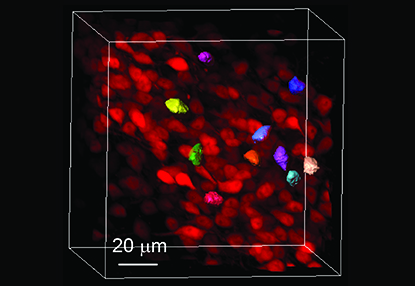Research News: Exposure to chronic stress changes neurons in the brain
Wataru Inoue, PhD, studies the effect of chronic stress on the brain. His latest paper, “Neuronal hypertrophy dampens neuronal intrinsic excitability and stress responsiveness during chronic stress,” led by his recent graduate student Sara Matovic, MSc’17, showed that the neurons in the brain actually change their size and microstructure, and become desensitized to stress signals over time. We spoke to him about these findings and what it might mean for future treatment. Inoue is an Assistant Professor in Physiology and Pharmacology and a Scientist at Robarts Research Institute.
What was the major finding in the paper?

It is well known that stress, especially chronic stress, can seriously damage our minds and bodies. Less appreciated is that we, and other animals too, are born with many ways to handle chronic stress, for example, by getting used to the same kind of stressful situations. It turns out we do this more or less all the time.
Our paper found a new mechanism for a group of stress-controlling neurons that help us to get used to chronic stress. Specifically, these neurons sit in the hypothalamus, which is an older part of the brain, and control stress hormone release, which is a major stress response. We found that these neurons became less and less sensitive to stress signals when mice received the same type of stressor over and over again.
One cool part of this finding is that these neurons grow their size as they get used to chronic stress, and we propose that this is one simple way to decrease their sensitivity to stress.
Communications between neurons is similar to filling a champagne tower; one neuron communicates with another when it receives a certain amount of inputs and is filled, reaching the threshold for communicating to the next. Growing its size is like having a bigger glass, and this means bigger neurons need more inputs to communicate to the next. So, in the case of responding to stress signals, bigger neurons are less sensitive.
Another twist of our findings is that these neurons do not simply become bigger, but they increase miniature folding of their surface membrane. This is a strategy to increase surface size within the already tightly-packed brain under the skull.
Why is studying chronic stress so important?
Being stressed about potentially harmful situations is totally normal, and in fact, essential for survival. In the short-term, it helps us to avoid actual damages. For example, the feeling of fear makes you avoid danger and an increasing heartbeat prepares you for an escape or a fight that may need to occur a moment later. But the problem is that these responses to stress have costs and place a burden on your mind and body. If they are chronically activated, they can cause serious problems. Many stress-related disorders involve damages resulting from our own response to stress.
Studying chronic stress is important because we can understand how otherwise adaptive stress response goes awry. Such scientific knowledge is the foundation for developing better preventions, diagnoses and treatments for stress-related disorders.
How might this finding change the way we think about chronic stress?
Our findings shed light on our ability to adapt to chronic stress and the biology behind stress resiliency. This is less appreciated than the harm chronic stress can cause. Our findings suggest that promoting our stress resiliency mechanisms is one promising way to prevent health problems resulting from chronic stress.
How might it change the way we treat chronic stress?
How chronic stress causes health problems is very complex, and our findings encourage more follow-up studies to learn how it can contribute to future treatments. Our next steps are to manipulate the process of these stress hormone-controlling neurons to change their size and to ask how it will change the stress hormone regulation during chronic stress. Dysregulation of stress hormone levels are one of the most common abnormalities found in stress-related disorders such as depression and PTSD.
The current pandemic may be a source of chronic stress for some - how might your findings shed light on the current situation?
 During the current pandemic situation, it is more important than ever to understand how chronic stress affects our health and how we can better cope with it. This requires collective efforts from many different research fields. Our findings shed light on the biological processes and how our brains can change their shape and function at the cellular level. One important thing to bear in mind is that the types of stress matters for how animals adapt to, or fail to adapt to, chronic stress. We don’t really know what kind of stress we receive from a pandemic of this scale and the life changes associated with it. One important direction for future research related to this pandemic is to understand the types of chronic stress that impact our health, and use relevant animal models to further study underlying mechanisms and potential interventions.
During the current pandemic situation, it is more important than ever to understand how chronic stress affects our health and how we can better cope with it. This requires collective efforts from many different research fields. Our findings shed light on the biological processes and how our brains can change their shape and function at the cellular level. One important thing to bear in mind is that the types of stress matters for how animals adapt to, or fail to adapt to, chronic stress. We don’t really know what kind of stress we receive from a pandemic of this scale and the life changes associated with it. One important direction for future research related to this pandemic is to understand the types of chronic stress that impact our health, and use relevant animal models to further study underlying mechanisms and potential interventions.








